'Black Mirror' Continues to Rage Against the Machine, Reflecting the Best — and Worst — Sides of Our Nature
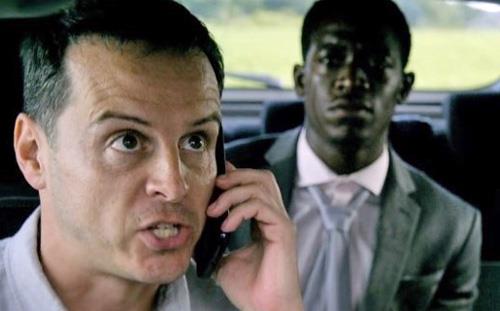
For all the different ways Black Mirror depicts its dystopian worlds, all of them set in a not-too-distant future where machine-learning has made our lives more comfortable and A.I. — artificial intelligence to the pre-Westworld crowd — has seemingly solved all our problems, one theme keeps emerging: For all technology’s advances, and some of them are truly astonishing, those advances always bring with them unintended consequences.
Who knew the promise to make us happier, lead more productive lives, and make the world a better place could be so complicated?
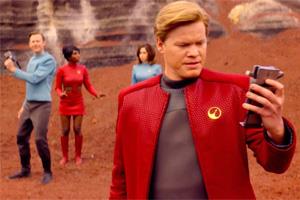 I recently binge-watched early episodes of Black Mirror, this after watching the most recent episodes (three hour-long episodes in all, which Netflix released a few weeks ago), and to mainline Black Mirror in that way is an eye-opening experience, literally and figuratively. It’s a psychological thriller anthology that — unlike the better-known remake of The Twilight Zone, which like other recent remakes trades more on its name recognition and our fond memories of Rod Serling’s original than any cutting-edge breakthroughs of its own — works as both psychology and as a thriller.
I recently binge-watched early episodes of Black Mirror, this after watching the most recent episodes (three hour-long episodes in all, which Netflix released a few weeks ago), and to mainline Black Mirror in that way is an eye-opening experience, literally and figuratively. It’s a psychological thriller anthology that — unlike the better-known remake of The Twilight Zone, which like other recent remakes trades more on its name recognition and our fond memories of Rod Serling’s original than any cutting-edge breakthroughs of its own — works as both psychology and as a thriller.
Black Mirror was always going to be one of Netflix’s more audacious, envelope-pushing dramas, but it wasn’t until little more than two years ago — a blink-of-any-eye in TV terms — when it truly broke into the mainstream, with back-to-back Emmy wins for outstanding television movie, with the episodes "San Junipero" and the eerily Star Trek-themed "USS Callister" (above).
More tellingly, series co-creator, showrunner and its most prolific writer Charlie Brooker won back-to-back Emmys for writing a limited series, movie or dramatic special, which put Black Mirror in the same league as Godless, Twin Peaks: The Return, critics’ darling American Crime Story: The Assassination of Gianni Versace, Big Little Lies, Feud: Bette and Joan, the most recent season of Fargo and HBO’s The Night Of. That’s pretty high rent for an obscure little show Brooker himself described in his Emmy acceptance speech as an obscure little show he originally didn’t think anyone would pay attention to aside from a few die-hards — though that wouldn’t stop him and his fellow writer-producer Annabel Jones from giving it their all.
By now, most people who really wanted to see the new episodes have seen them; Netflix released them on June 5. As Stranger Things has proved, though, there are those who watch a show from the very beginning, and then there are those who come to it late, lured by word-of-mouth and curious to see why so many are so passionate about it.
 The new episodes are representative of the earlier ones, with similar strengths and weaknesses. Bottom line: If you’ve been left a bit cold by the various remakes of Outer Limits and Twilight Zone, mildly entertained but not blown out of your socks, prepare to be, well, yes, blown out of your socks. When Black Mirror is good — and there are moments in these new episodes when it is very good indeed — it is as harrowing and insightful — and redemptive — as anything Rod Serling wrote back in the 1950s, when he quite candidly admitted that since he couldn’t do the kind of hard-hitting, Playhouse 90-style social takedowns of the McCarthy era, without losing his career and possibly even his freedom, he turned to sci-fi instead. Serling always saw Twilight Zone — the black-and-white original, anyway — as a way to tackle racism, inequality, crime and punishment, domestic violence, government overreach, the perils of living in a nuclear age and abuse in all its forms without running afoul of network censors, skittish advertisers — or the House Un-American Activities Committee (HUAC).
The new episodes are representative of the earlier ones, with similar strengths and weaknesses. Bottom line: If you’ve been left a bit cold by the various remakes of Outer Limits and Twilight Zone, mildly entertained but not blown out of your socks, prepare to be, well, yes, blown out of your socks. When Black Mirror is good — and there are moments in these new episodes when it is very good indeed — it is as harrowing and insightful — and redemptive — as anything Rod Serling wrote back in the 1950s, when he quite candidly admitted that since he couldn’t do the kind of hard-hitting, Playhouse 90-style social takedowns of the McCarthy era, without losing his career and possibly even his freedom, he turned to sci-fi instead. Serling always saw Twilight Zone — the black-and-white original, anyway — as a way to tackle racism, inequality, crime and punishment, domestic violence, government overreach, the perils of living in a nuclear age and abuse in all its forms without running afoul of network censors, skittish advertisers — or the House Un-American Activities Committee (HUAC).
Brooker is working in a different political milieu — for now — but he has zeroed in on an equally chilling threat to the way we live our daily lives — A.I. technology’s mission creep, and the way our addiction to screens, coupled with omnipresent government and corporate surveillance of every single thing we do, from the moment we wake up in the morning to the time we go to bed at night.
Because Black Mirroris an anthology, one can watch the three newest episodes, "Striking Vipers," "Smithereens," and "Rachel, Jack and Ashley Too," fresh, without any prep or preamble. They work effectively as standalone episodes, too, though one is going to have their preferences as to which one they prefer, of course.
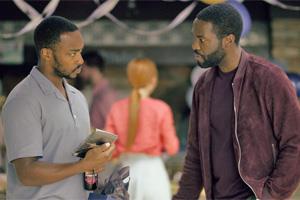 After seeing all three, and taking them as a whole, the early-season episodes I would recommend for anyone looking to binge-watch similarly themed episodes from earlier in Black MIrror’s lifestream, would be 2011’s dazzling American Idol-inspired "Fifteen Million Merits" (“inspired” isn’t quite the right word, though you’ll catch the gist soon enough), and 2013’s harrowing, white-knuckle thriller "White Bear", a crime-and-punishment, post-apocalyptic survivalist tale that — for me, anyway— puts The Walking Dead to shame, especially the recent, lousy seasons. It’s no accident that Brooker — a former game-show host in his native UK — had a hand in writing both "Fifteen Million Merits" and "White Bear."
After seeing all three, and taking them as a whole, the early-season episodes I would recommend for anyone looking to binge-watch similarly themed episodes from earlier in Black MIrror’s lifestream, would be 2011’s dazzling American Idol-inspired "Fifteen Million Merits" (“inspired” isn’t quite the right word, though you’ll catch the gist soon enough), and 2013’s harrowing, white-knuckle thriller "White Bear", a crime-and-punishment, post-apocalyptic survivalist tale that — for me, anyway— puts The Walking Dead to shame, especially the recent, lousy seasons. It’s no accident that Brooker — a former game-show host in his native UK — had a hand in writing both "Fifteen Million Merits" and "White Bear."
Crazily, Brooker wrote "Striking Vipers" (above), "Smithereens" and "Rachel, Jack and Ashley Too," too.
Perhaps — if you believe in reincarnation and the Dalai Lama — he really is Rod Serling.
Here goes. Keep in mind that, because these three episodes have already been released and are out there, other reviewers have weighed in with their judgments. Your truth may not be the same as mine. And while I have my definite favorite, there is something to recommend in all three tales. Black Mirror has never been a limp reboot of the tried-and-true and, thankfully, Brooker and Jones don’t look as if they’re about to start now.
1. Striking Vipers
"Striking Vipers" starts quietly, but it’s not long before the tension begins coiling around what at first seems like an ordinary, latter-day rom-com centered on an anniversary reunion between best friends from college; Danny is happily married, with a young son, a good job and a comfortable home in the burbs with a big garden. His friend Karl is single, somewhat at loose ends career-wise, and is seemingly content to be living alone, with few if any responsibilities. Karl has seemingly become obsessed with a virtual-reality fighting game called Striking Vipers X, in which players not only take on the form of avatars but can actually feel the physical sensations of their chosen character. He challenges Danny to play the game with him — compete in the game’s game-within-a-game arena, in other words — and before you can say, “Exit program,” the game takes on a life of its own, and relationships in the real, outside world are pushed to the breaking point as a result.
 To say more would ruin the many surprises — no spoilers here — and, even if you don’t find yourself as engaged as I was, "Striking Vipers" is worth a look. You do need to go into it with an open mind, though. In more ways than one.
To say more would ruin the many surprises — no spoilers here — and, even if you don’t find yourself as engaged as I was, "Striking Vipers" is worth a look. You do need to go into it with an open mind, though. In more ways than one.
Anthony Mackie is both believable and fine as the lead character, Danny.
2. Smithereens
"Smithereens," my favorite of the three — by a country mile — is the one that has drawn some of the least enthusiastic reviews of those reviewers who’ve seen all three episodes and gone on the record with their findings. What can I say? I saw much in "Smithereens"they didn’t, clearly, and I recommend it heartily, without reservation.
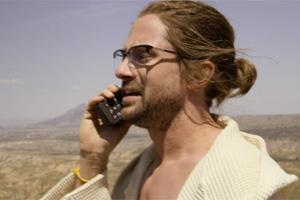 Andrew Scott, an Irish actor who’s made a name for himself of late playing some of the all-time bad guys on screens both big and small — conniving “C” in the James Bond film Spectre, Moriarty in Sherlock— delivers a harrowing, multi-shaded performance, both empathetic and scary, as Christopher Gillhaney, a driver for an Uber-type app called Hitcher. We first see him in a group therapy session for people who’ve faced a recent tragedy and are finding it hard to cope. The following morning, he picks up a tech worker, Jaden, at random, outside the office of Smithereen, the Google/Facebook-style social media company where Jaden works.
Andrew Scott, an Irish actor who’s made a name for himself of late playing some of the all-time bad guys on screens both big and small — conniving “C” in the James Bond film Spectre, Moriarty in Sherlock— delivers a harrowing, multi-shaded performance, both empathetic and scary, as Christopher Gillhaney, a driver for an Uber-type app called Hitcher. We first see him in a group therapy session for people who’ve faced a recent tragedy and are finding it hard to cope. The following morning, he picks up a tech worker, Jaden, at random, outside the office of Smithereen, the Google/Facebook-style social media company where Jaden works.
Again, no spoilers. Since it’s integral to the plot, though, and because it happens within minutes of the "Smithereens" opening scene, it’s not giving too much away to reveal that Christopher takes Jaden hostage, for some as-yet unrevealed reason.
The following hour is a gradually tightening pressure-cooker as we learn how the hostage-taking will play itself out, and why Chris is doing what he is.
It’s hard to overestimate just how realistic and adult the scenario is here. There’s real psychic, psychological pain, but at no point does "Smithereens" feel calculating or deliberately manipulative. Time after time, in situations where a lesser writer would take the easy out — good cop/bad cop come up against good guy/bad guy — Brooker goes for emotional depth and real meaning.
The ending threw me for a loop, not least because, of all the endings I might have imagined, I didn’t see this one coming.
The casting is inspired in supporting roles as well as the leads. Topher Grace — yes, that Topher Grace (above), of That ‘70s Show fame — is utterly convincing, and really rather good, as the Steve Jobs-type tech mogul who created and runs Smithereen.
There’s one terrific scene after another. It’s both tense and heartbreaking, and despite the virtual mind games, there are moments when"Smithereens"feels almost like a camera-on-the-wall documentary. It’s that real.
3. Rachel, Jack and Ashley Too
"Rachel, Jack and Ashley Too" is the best-reviewed of the three — though it’s my least favorite — and it’s getting the most media attention, because it stars Miley Cyrus as Ashley O. (below), a pop superstar with a hit TV show, a rabid following, a monster concert tour, and a massive social media presence. (Don’t scoff. Cyrus has many potentially overdramatic, emotionally over-the-top scenes, but she’s a decent actor and more than up to the job. Oddly, it’s the writing that fails her this time.) Rachel, a nicely understated performance by 17-year-old Australian ingenue Angourie Rice, plays Rachel, a mousy, insecure teen with an eccentric, working-class single dad and a difficult older sister who bullies her relentlessly.
Rachel develops an unhealthy obsession with Ashley O, and sees her public persona as something to both aspire to and emulate — unaware that off-screen Ashley O. is struggling with personal crises of her own, some self-inflicted, some caused by fame and the constant glare of the media spotlight.
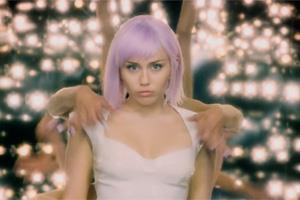 So far, "Rachel, Jack and Ashley Too" is engaging, equal to the level of other Black Mirror episodes, and while its depiction of show business as a cruel, heartless, uncaring industry will strike some as a little trite and obvious, it’s uncanny in just how realistically it draws its portrait. There’s an exquisite irony in the idea that a much-lauded fictional drama called Black Mirror should hold such a dark mirror to the entertainment industry, but there it is. (It would have been fun to be a fly-on-the-wall in Netflix’s screening room when company executives first watched this episode, but some highlight moments will just have to wait for the behind-the-scenes documentary.)
So far, "Rachel, Jack and Ashley Too" is engaging, equal to the level of other Black Mirror episodes, and while its depiction of show business as a cruel, heartless, uncaring industry will strike some as a little trite and obvious, it’s uncanny in just how realistically it draws its portrait. There’s an exquisite irony in the idea that a much-lauded fictional drama called Black Mirror should hold such a dark mirror to the entertainment industry, but there it is. (It would have been fun to be a fly-on-the-wall in Netflix’s screening room when company executives first watched this episode, but some highlight moments will just have to wait for the behind-the-scenes documentary.)
For me, though — and I don’t want to give too much away — I didn’t care for the ending at all. Which is a surprise because, in episode after episode after episode, one thing Black Mirror does really well, is endings.
I have my theory as to what happened, behind the scenes, but as I say, no spoilers here. I’m not going to ruin any surprise. "Rachel, Jack and Ashley Too" is worth seeing — they all are. Just don’t expect that they saved the best for last, even though others might disagree.